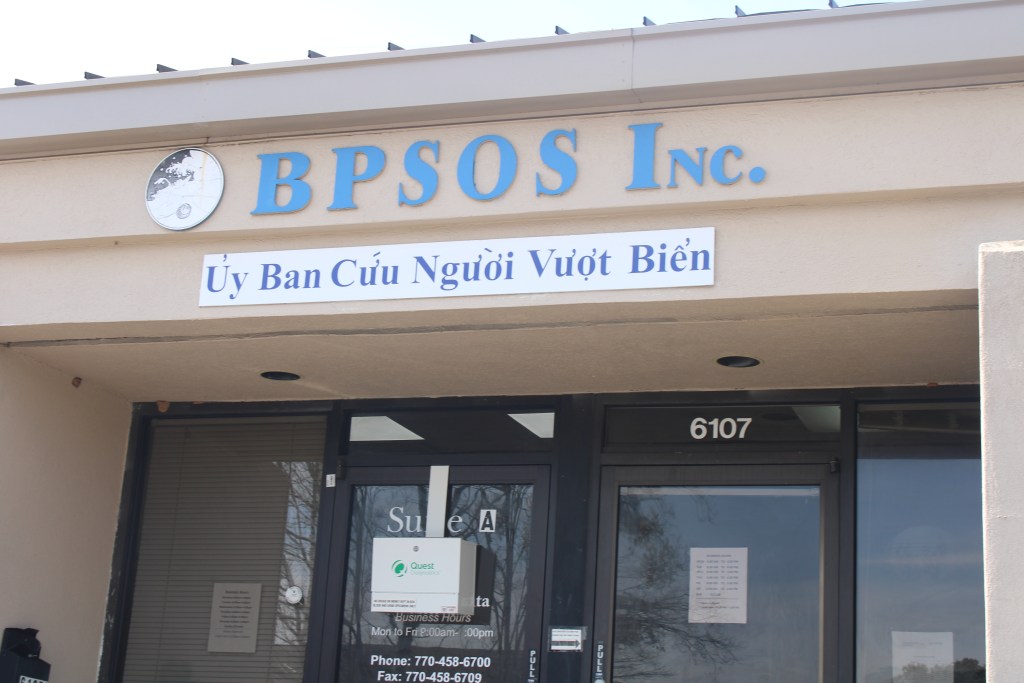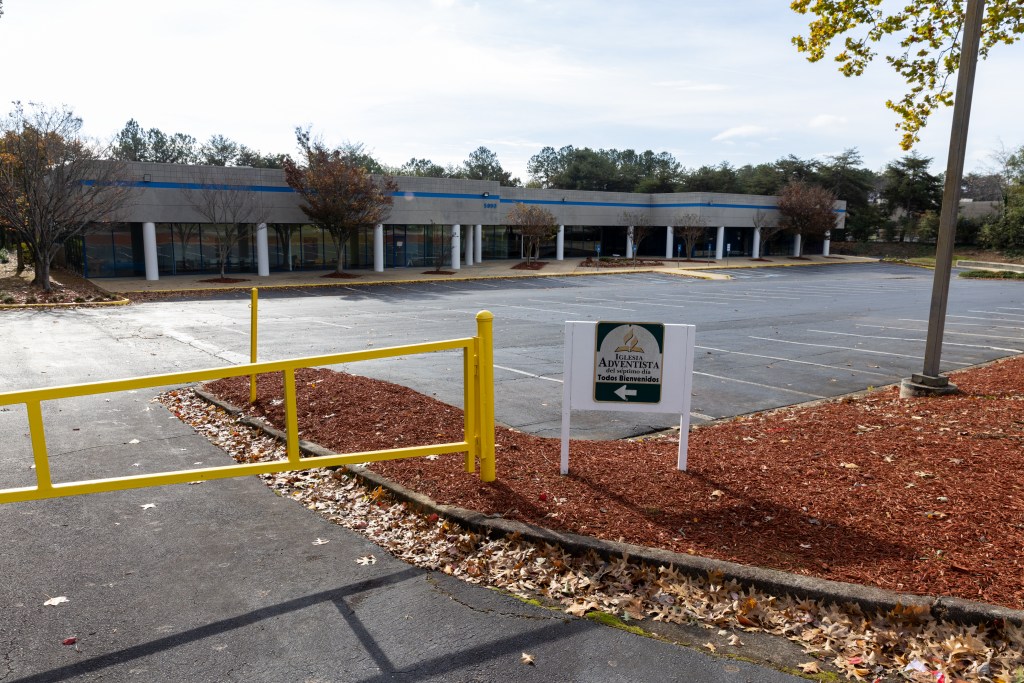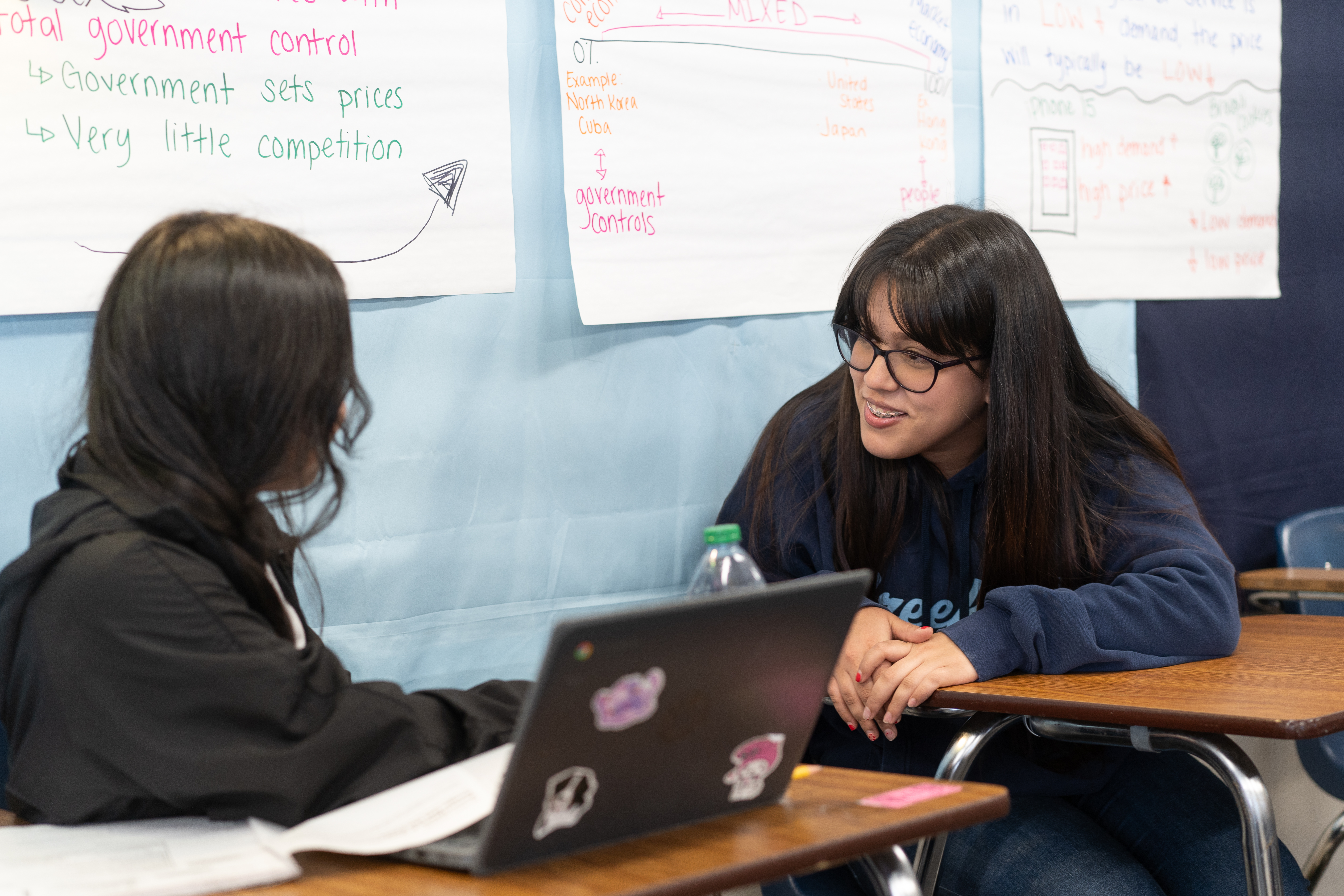Canopy Atlanta asked over 100 Norcross community members about the journalism they needed. This story emerged from that feedback.
Canopy Atlanta also trains and pays community members, our Fellows, to learn reporting skills to better serve their community. Daniela Racines, a reporter on this story, is a Canopy Atlanta Fellow.
Trinh Pham is executive director of the Norcross-based Atlanta chapter of Boat People SOS (BPSOS), a Vietnamese American non-profit targeting immigrant and low-income community members. “We help people to resettle in [the] U.S.,” Pham says. “[But] they still need us because we found our community had the biggest barriers in culture and language access.”
In Norcross, a city that has become a destination for immigrants settling in Georgia, 47.2 percent of the population speak a language other than English at home, including Spanish, Vietnamese, and Korean, according to the Census Bureau in 2023.
Georgia’s laws aren’t immigrant friendly, barring DACA recipients from attending some public universities, among other limitations. However, as part of the Welcoming America Network, made of cities dedicated to implementing “intentional, inclusive policies, practices, and norms” for immigrants, Norcross serves as a model on how to make amenities more accessible for all.
But organizations like BPSOS still have to fill important gaps for immigrants, reviewing documents such as leases for homes or small businesses on their behalf.
Moreover, Pham says that Vietnamese translations provided locally—whether by hospitals to communicate medical information or by the Georgia Department of Driver Services in driver’s tests—either feature poor grammar or don’t account for how much the Vietnamese language has changed. “Someone will translate who came here 50 years ago,” Pham says, to where the “current generation cannot understand it.”
“Actually, I currently have someone here [in the office] who has taken the test in Vietnamese, but they couldn’t understand it,” she shared.
Other translations don’t appear to account for differences in understanding based on cultural distinctions. BPSOS-Atlanta assists families with applying for Medicare and Medicaid. Many Vietnamese families will have multiple generations living together. BPSOS has found that when applying for benefits, it’s easy for families to interpret “household” incorrectly, with applicants stating that children support the parents by contributing to rent, which can disqualify them from benefits that they do actually qualify for.
“We say that we’re not only bilingual, but bicultural,” Pham says.
With the help of community nonprofits and leaders, Canopy Atlanta explores the many ways language and cultural barriers otherwise create a disconnect in some of the most crucial parts of life in Norcross.
Policing
Norcross is primarily policed by two departments: the Norcross Police Department, which covers the official city limits, and the Gwinnett County Police Department West Precinct, which covers the unincorporated areas.
Thirty five percent of the NPD speak a second language, says Norcross Chief of Police Bill Grogan. Twenty two percent of NPD’s uniform patrol officers speak Spanish.
NPD and West Precinct also have a contract with LanguageLine, which connects dispatchers and police officers in the field to translators by phone. The most common languages requested in the West Precinct include Spanish, Korean, and Vietnamese, according to precinct commander Jordan Griffin.
Meanwhile, over the past year, NPD processed over 1,600 LanguageLine calls from residents speaking Spanish, Vietnamese, Korean, Mandarin, and Arabic.
“A lot of people fall through the cracks.”
Arelis Rivera worked at NPD for nearly a decade until her recent retirement. She was the department’s sergeant of community outreach, overseeing a Hispanic Citizens Police Academy that taught residents in Spanish about laws and how to navigate them.
She says that NPD doesn’t coach officers on how to use LanguageLine. Aside from a “step-by-step guide” for how to use it, “you were basically on your own to figure it out.”
Moreover, officers could struggle to identify which language that non-English speaking residents require: “If you’re from other Spanish countries that speak Spanish, I can tell,” says Rivera, who speaks Spanish and is Puerto Rican. “But as a person who doesn’t know the dialects of each individual Asian country, I couldn’t tell you where [those residents] were from.”
“A lot of people fall through the cracks,” Rivera adds. Compared to someone fluent in English, who can very well report mistreatment or otherwise unsatisfactory behavior by police to their supervisor, “if you’re from Vietnam, and you had an experience with a police officer, and it was a negative experience, they’re not going to call. They’re not going to do anything.”
Aceli Zenil, co-founder of Amigos de la Comunidad Georgia, an organization supporting Latino families in the state, has met residents who are victims of domestic violence and car theft—like someone whose construction supplies they need to provide financially were stolen. But they won’t want to call the police because they think, “Maybe they will call immigration or ask for papers,” Zenil says.
House Bill 1105, which passed the Georgia Senate in late March, is expected to add to those fears, as it would grant local or state law enforcement authority to “arrest any person based on such person’s status as an illegal alien or for a violation of any federal immigration law.” As of now, it’s sitting on the Governor’s desk waiting to possibly be signed into law.
Healthcare
“There are not enough bilingual translators who understand medical terminology,” says Greg Lang, former executive director and current chief financial officer of Good Samaritan Health Centers of Gwinnett. As a result, “non-English speaking patients often do not fully understand the education and instructions given to them by a healthcare provider.”
That’s if such patients make a doctor’s visit in the first place. “Generally, the health literacy of non-English speaking patients born in underdeveloped countries is quite limited, as in they do not understand the need for prevention screening, vaccination, and long-term medication use,” Lang says. “Sadly, high blood pressure has no symptoms, and cancer has no symptoms until it is in advanced stages. . . . They tend to believe the absence of symptoms means nothing is wrong.”
A lack of access to healthcare compounds what gets lost in translation, which can ultimately lead to “premature deaths, infectious disease, and untreated chronic conditions,” says Roxana Chicas, assistant professor at Emory University’s nursing school.
“Non-English speaking patients usually wait to seek medical attention because of the fear of a high out-of-pocket medical cost and lack of culturally and linguistically appropriate care. . . . For immigrants with limited English proficiency, they often face a combination [of] factors that delays seeking care even more,” Chicas says. Those factors include long work hours, lack of transportation, lack of sick pay, and cultural stigmas around mental health.


Photos by Sophia Qureshi
Such inequities are why BPSOS runs a community clinic, staffed entirely by volunteers, to offer free health screenings, primary care, and vaccinations. BPSOS also partners with Uber to provide rides for patients to their appointments.
“We educate people: You need to have an annual check-up,” Pham says. “So we partnered with Emory University to offer free services, because we found many families couldn’t afford health insurance.”
Schools and Education
Even before the school year starts, just signing children up for school at all can be a challenge without English proficiency.
Zenil’s organization, Amigos de la Comunidad Georgia, assists those who need it with that process: “Some families call me and they say, ‘Oh I need to sign my kids [up for] school, and I don’t know how to do [it].”
“I am a parent in the Gwinnett County Public School System, and they recognize me as Vietnamese and even though I understand English, they send me materials all the time in Vietnamese,” Pham says. “But I couldn’t understand, so I had to read the English [version].”
“When the kids spend time in ESOL, they don’t have opportunities to go into other programs.”
Another issue that Zenil raised is that even children of immigrant parents who are born in the United States are placed in English as a Second Language (ESL) programs. Parents are still left with questions: Two moms from Norcross called Zenil recently about this topic, stating that their kids are in ESL but they don’t know why.
Zenil has heard of students who cannot test out of these programs (“sometimes the kids, they’re nervous when they have the test”)—and whose parents struggle to interpret the test results their children receive. Those children stay enrolled for “three to four years,” which prevents them from meeting other graduation requirements. “When the kids spend time in ESOL, they don’t have opportunities to go into other programs,” she says.
Zenil says that in 2023, Amigos de la Comunidad co-hosted two panels that explained what it means for students to be enrolled in ESOL programs. Earlier this year, the organization met with the office of Gwinnett County Public Schools superintendent Calvin Watts to discuss why students are kept in ESOL programs “when kids are born here and speak English,” Zenil says.
“We asked . . . how the kids can be for a long time in that program when they can do something else. This is a big problem, because it’s more Latino students in the program.”
Elections
In Georgia, where most counties are only legally obligated to provide election ballots in English, “language access [is] a patchwork based on local leadership in interest,” says Gigi Pedraza, Executive Director and Founder of Latino Community Fund Georgia. In that regard, Gwinnett County is a rarity, being the only Georgia county mandated by federal law to provide materials and ballots in Spanish.
“As a county, Gwinnett does a good job in trying to be inclusive and thinking about providing in-language resources and tools for voters, such as making it a priority to have all the information on the website translated [and] trying to recruit bilingual poll workers,” says Berenice Rodriguez, organizing and civic engagement director at Asian Americans Advancing Justice Atlanta.
“However, a lot of those capacities are in English and Spanish only. Norcross, specifically, covers a wide range of AAPI communities—and we are not seeing that same effort being reflected in other Asian languages like Korean, Vietnamese, Mandarin, etc. That poses a big challenge.”

Photo by Dustin Chambers
BPSOS helps Vietnamese residents register to vote and understand the election process. Atlanta chapter executive director Pham says while ballots are translated, their grammar in particular could use improvement: “I’m glad so many agencies have Vietnamese translations now.” However, “there are bad translations all the time, everywhere.”
Beyond language barriers, “people don’t have too much [of an] interest to vote because most people say [the government] doesn’t do anything, the government doesn’t change anything. . . . It’s really hard to convince the community to vote,” Zenil says.
That’s why organizations like AAAJ host events like the “art form of dumpling making” that are simultaneously cross-generational conversations about voter engagement and education.
“It’s not a workshop, you’re not coming in and just sitting down and hearing me talk. You’re doing something,” Rodriguez says. “We invite our canvassers who are all younger folks and our youth cohort, which are all high schoolers. . . . And you have all your older moms or grandmas who are here, trying to teach you how to do this.”
Tamale sessions could be up next on their list.
“We just have conversations like, ‘Are you guys voting? Do you guys care about the elections? Why or why not?’” she says. “So those are the different types of engagement that are a bit more creative, that I think make a bigger impact.”
Editor: Christina Lee
Fact Checker: Janat Batra
Canopy Atlanta Reader: Kamille Whittaker




